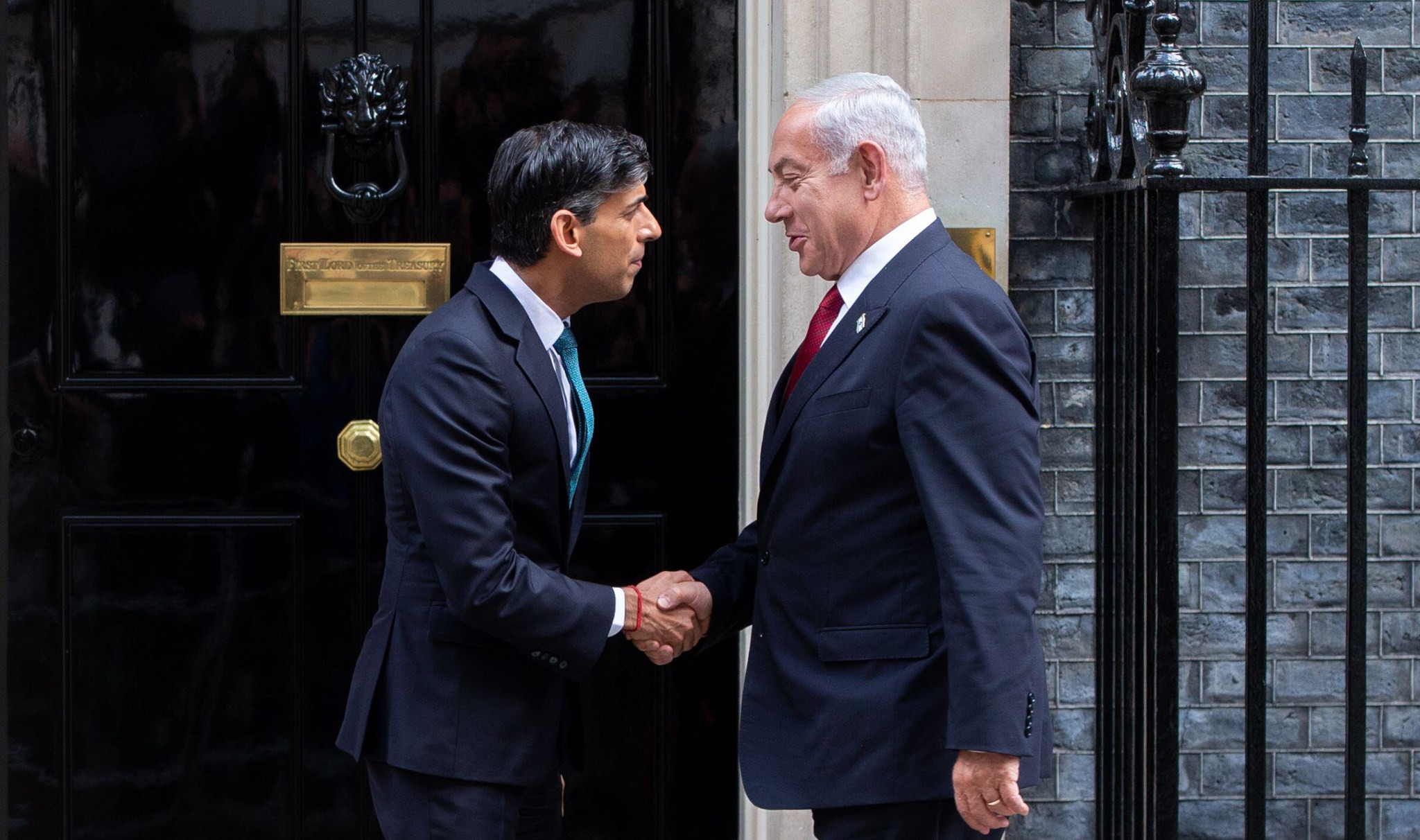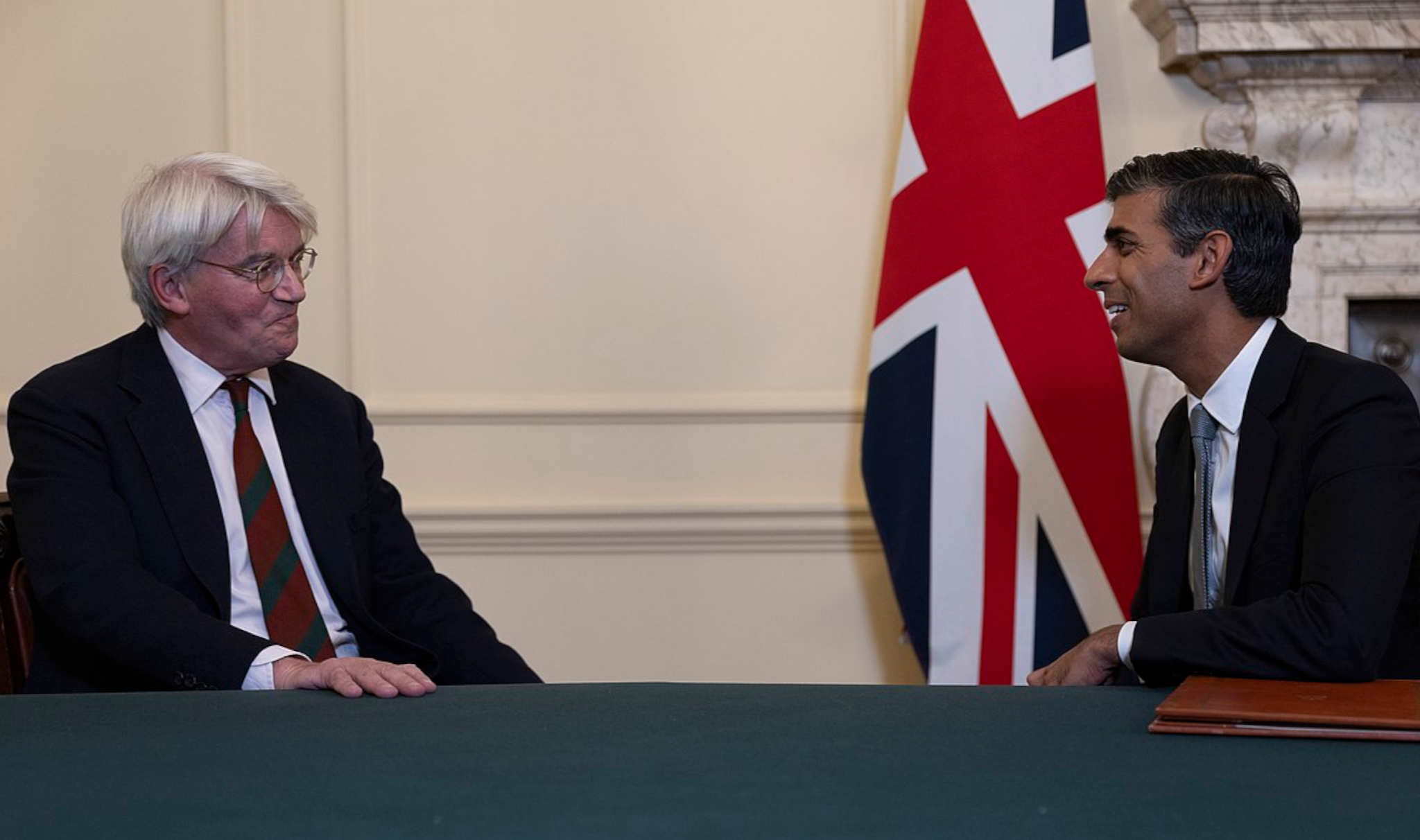UK military support for Israel’s genocide was pre-planned
In aiding Israel’s mass attacks on Palestinians in Gaza, Britain is implementing an agreement openly signed with Netanyahu’s far-right coalition – which has been almost entirely ignored in the UK national media.

Rishi Sunak met Benjamin Netanyahu days after the Roadmap was signed. (Photo: Tayfun Salci via Alamy)
“The bilateral relationship has never been stronger”, began a landmark “Roadmap” signed by Britain and Israel in March last year.
The accord committed the two states “to tackle shared threats” as part of a “close strategic partnership, with extensive defence and security cooperation”.
London and Tel Aviv also committed themselves “to take decisive and concerted actions against globally designated terrorists and terrorist entities”, a nod to Hamas and Hezbollah.
This was part of “a strong and evolving defence relationship” that “enshrines ongoing joint training and exercises that will continue to benefit both countries through strengthening military ties”.
Within just seven months, the Roadmap was being decidedly put into practice. Declassifiedhas documented a range of UK military support for Israel during its invasion of Gaza.
Since the onslaught began, the Royal Air Force has flown dozens of spy missions over Gaza and at least six Israeli military personnel have received training in the UK.
Nine Israeli military planes have visited Israel, with the British government refusing to say what is on board. Declassified has also found that the US military has been supplyingweapons to Israel using the UK’s base on Cyprus.
None of this has troubled the UK national media. But all of it is consistent with the pledges contained in the Roadmap.
This month, the RAF even flew to Israel’s defence by shooting down drones from Iran – which were launched in retaliation for Israel’s illegal attack on Iran’s consulate in Damascus, Syria.
In a separate section on Iran, the Roadmap states that “we work closely to counter the current threat from Iran” and that “we will seek to counter Iran’s destabilising regional activity”.
“We will work to ensure Iran never has nuclear weapon capabilities”, adds the accord between the two nuclear weapons powers.
Protecting Israel globally
The 2023 Roadmap goes way beyond a previous memorandum of understanding between the UK and Israel signed in 2021.
It explicitly states the two countries are “natural allies” – ignoring Israel’s pariah status among much of the rest of the world due its illegal occupation of the West Bank and “apartheid” system discriminating against Palestinians.
Notably, the Roadmap has a section entitled “Antisemitism, delegitimisation, and anti-Israel bias” whose wording directly prophesies Britain’s extraordinary apologias for Israel’s Gaza atrocities in international fora.
It calls for “tackling the disproportionate focus on Israel in the UN and other international bodies, including attempts to delegitimise it or deny its right to self-defence. All states have a duty to comply with their obligations under international law, but scrutiny must be measured, impartial and proportionate.”
Since Israel’s attacks, British ministers have thoroughly put this into practice. They have consistently apologised for Israel’s atrocities in the name of “self-defence” and have repeatedly point blank refused to condemn Israel’s violations of international law.
The Roadmap also called for “strengthening cooperation and coordination in the UN and other multilateral fora, in line with national interests and priorities, and advancing Israel-UK alignment on key global challenges”.
In line with this commitment, the UK has repeatedly defended Israel from international censure over Gaza at the UN, repeatedly voting against or abstaining on UN Security Council resolutions demanding a ceasefire.
Court of Justice
Another section of the Roadmap promises British protection for Israel in international legal bodies such as the International Court of Justice (ICJ).
In reference to an earlier case concerning the West Bank, it stated: “The UK and Israel believe that the latest ICJ referral on the Israeli-Palestinian conflict represents an inappropriate recourse to the Advisory Opinion mechanism as this undermines the efforts to achieve a settlement through direct negotiations between the parties”.
Similar wording would be deployed by British ministers to undermine South Africa’s genocide case against Israel at the ICJ, which commenced in January.
Deputy foreign secretary Andrew Mitchell, Britain’s chief apologist for Israeli crimes, has said “South Africa’s decision to bring the case was wrong and provocative”, dismissing the charge of genocide against Israel as “hideous”.
Secret agreement
Then there is the secret military agreement signed between the UK and Israel in December 2020.
Declassified discovered the existence of this accord from a tweet by the Israel Defense Forces. The UK government never publicised it.
Ministers have subsequently refused to make the accord public “for national security reasons”.
Defence minister James Heappey told parliament that “the agreement is an important piece of defence diplomacy that formalises and deepens cooperation”, but has only given a cursory summary of its contents in response to a parliamentary question.
What does the agreement commit the UK to militarily? Is the UK putting into practice those commitments now, over Gaza? If it’s so innocuous, why does the government keep it secret?
As far as Declassified understands, this accord has only ever been mentioned once in all of the British mainstream media.
Ben Wallace, the defence secretary who signed the secret accord with Israel in 2020, last December accused his ally of embarking on a “killing rage” in Gaza, adding that its attacks on Hamas were “crude and indiscriminate”.
When asked on Twitter by our chief reporter whether his secret deal made Britain complicit in the slaughter, he replied: “Obviously it doesn’t.”
In fact, Britain has long provided Israel with support for combat operations against Palestinians, but this has, again, not been noticed across the entire British national press.
ABOUT THE AUTHOR
Mark Curtis is the editor of Declassified UK, and the author of five books and many articles on UK foreign policy.
VIEW MORE ARTICLES





No comments:
Post a Comment